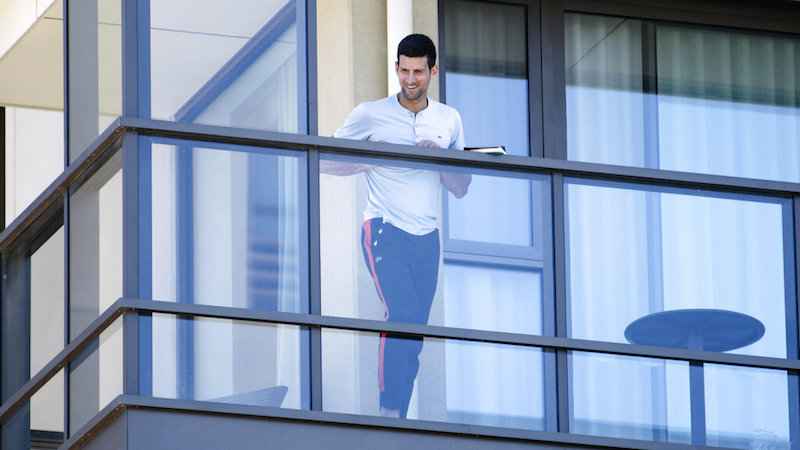3 more COVID-19 cases linked to Australian Open arrivals

Serbia's Novak Djokovic stands on the balcony at his accommodation in Adelaide, Australia, Tuesday, Jan. 19, 2021. Australian Open tournament director Craig Tiley defended Djokovic for appealing to Australian Open organizers to ease restrictions so players could move to private residences with tennis courts.[Morgan Sette/AAP Image]
Two players are among the three latest COVID-19 cases that have emerged from testing conducted on passengers who arrived on charter flights bringing people to Melbourne for the Australian Open.
Tournament director Craig Tiley said the players weren’t considered to be contagious, though, and hadn’t been taken out of the regular quarantine hotels.
The first six positive tests were reported over the weekend and connected to flights from Los Angeles, Abu Dhabi and Doha, Qatar.
All passengers on those flights, including 72 elite tennis players, were classified by local health authorities as close contacts of people infected with the coronavirus and forced into hard lockdown. That means they’re not allowed to leave their hotel rooms for the mandatory 14-day quarantine period. The six infected people, including a member of the aircrew on one flight and two coaches on different flights, were transferred to a medical hotel.
The Victoria state government announced three new positive tests on Tuesday, the first to involve players.
The Australian Associated Press quoted Tiley as saying the health department “will need to confirm that they are viral shedding but I can tell you that they’re not in the medical hotel.”
Tennis Australia declined to provide The Associated Press with a list of the 72 affected players, but many have made their status known via posts on social media.
More than 1,200 players, coaches, staff, officials and media arrived on flights in a 36-hour period until Saturday morning to prepare for the Australian Open, which starts Feb. 8.
Victoria state Premier Daniel Andrews said some of the cases linked to the tournament will be reclassified as “non-infectious shedding."
But the state’s chief medical officer, Brett Sutton, later said the reclassification was unlikely to mean any of the 72 players in lockdown — meaning they’re not allowed to leave their rooms for daily practice sessions like the broader player group — could leave isolation early.
All people traveling to Australia for the tennis tournament had to return a negative test before boarding the charter flights, although there was at least one exemption in the case of the historic shedding.
Tennys Sandgren, a two-time quarterfinalist at Melbourne Park, originally tested positive for the coronavirus in November and the Victoria state health authorities determined after reviewing the American player’s medical records that he was no longer contagious, although still shedding viral particles. So he was given approval to fly to Australia last week.
“My two tests were less than 8 weeks apart. I was sick in November, totally healthy now,” Sandgren wrote on Twitter. “There’s not a single documented case where I would be contagious at this point. Totally recovered!”
Some players have used social media to detail their perceived hardships of being in lockdown, some saying they weren’t aware of the strict quarantine regulations.
“These are high performing athletes and it is hard to keep a high performing athlete in a room,” Tiley said. “This is the contribution that they have to make in order to get the privilege of when they do come out to compete for $80 million ($62 million) in prize money."
Organizers had a zoom conference with players on Monday night and Tiley conceded he had faced criticism, saying some of the advance warnings of the risks may have been lost in translation.
“There was some big hits that we took but there were also some compliments. The most heartening thing at the end in the chat there was a scroll of thank yous from all the stars and players," Tiley said, according to AAP. "Sometimes the minority have the loudest voices.”
Tiley, appearing on Nine Network television on Tuesday, rejected calls from some men’s players to reduce Australian Open matches to best-of-three sets instead of best of five.
“We’re a Grand Slam,” Tiley said. “Right now, three out of five sets for the men and two out of three sets for the women is the position we plan on sticking to.”
He also defended Novak Djokovic for appealing to Australian Open organizers to ease restrictions in a list reported on Monday, including a request to shift as many players as possible in Melbourne to private residences with tennis courts.
Djokovic’s requests were quickly refused by Andrews.
“In the case of Novak, he wrote a note, these weren’t demands, they were suggestions,” Tiley said. “But he, too, is understanding what two weeks of lockdown means … every player coming down knew that if they were going to be close contacts or test positive that these were going to be the conditions.”
Djokovic is part of a smaller group of players who landed in the South Australia capital of Adelaide, along with Serena Williams, Naomi Osaka and Rafael Nadal, and are allowed outside for practice sessions under bio-secure protocols.
Australia’s international borders are mostly closed, although there are exemptions in special circumstances. All arrivals must do mandatory quarantine. Each of Australia’s states and territories has its own border and travel restrictions, and those can change on very short notice.
Victoria state, which has Melbourne as its capital, accounted for 810 of Australia’s 909 deaths from COVID-19, most of those during a deadly second wave three months ago which resulted in curfews and lockdowns for the city.